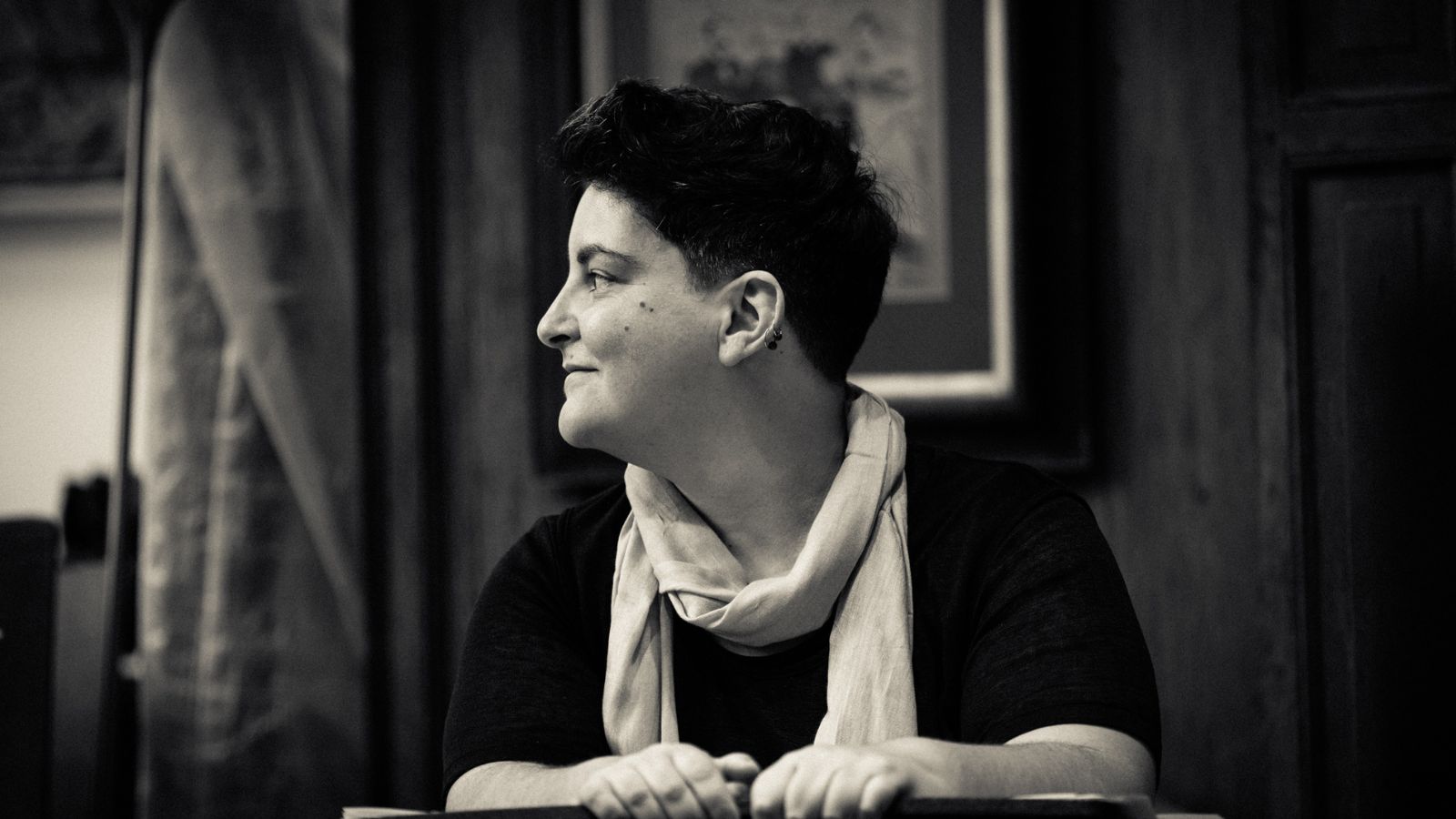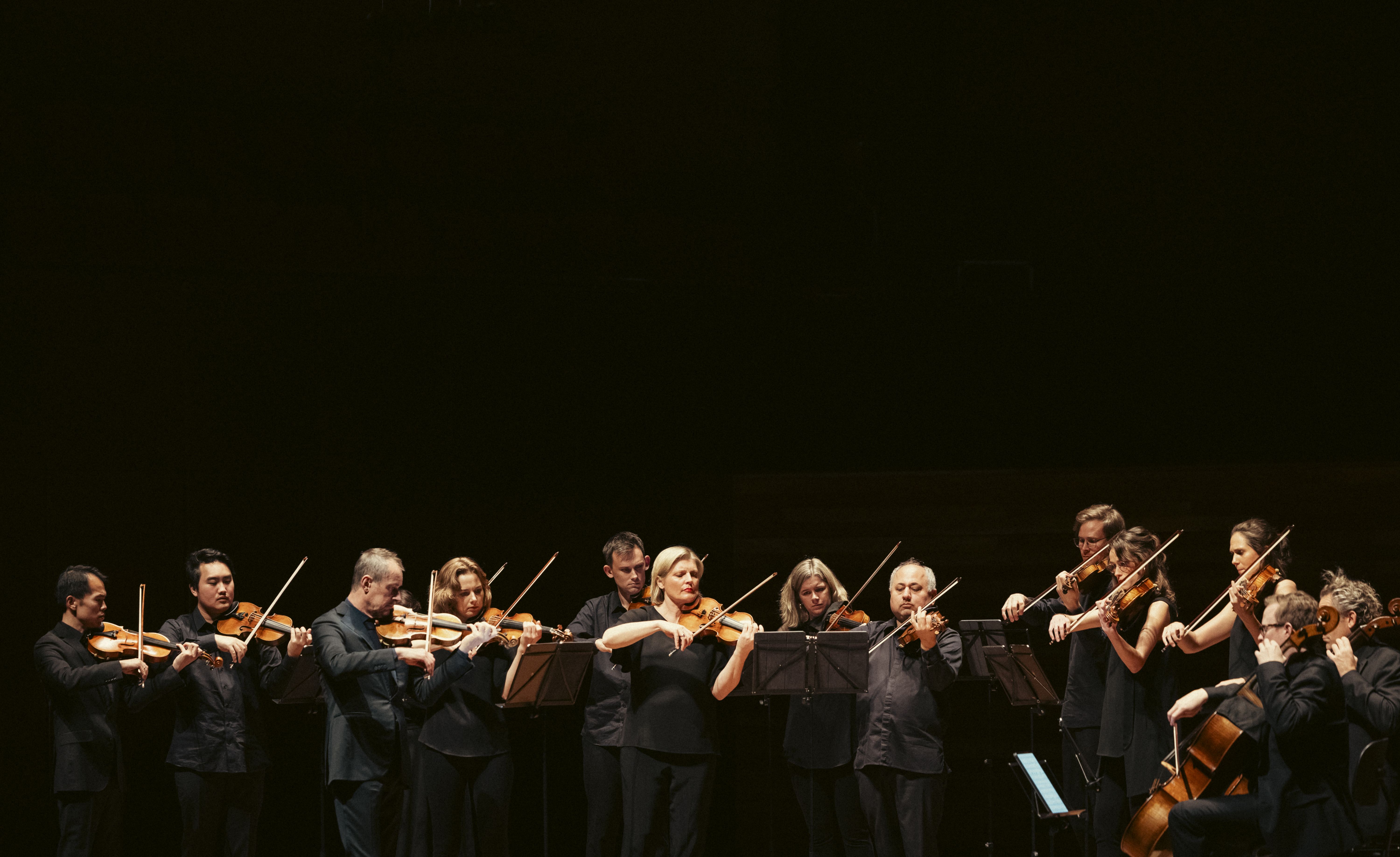
By Joseph Earp
If there has been one desire driving Canadian composer Cassandra Miller’s career, it’s to get out of her own way. Her acclaimed compositions, which are frequently based on pre-existing source materials, are born from an extensive, transformative process of meditation – an attempt to lose herself in the music. She doesn’t want to lead the creative process. She wants the composition to. “I just follow what the music wants,” she says, simply.
For instance, when she’s starting from a source – in the past she has drawn from pieces as varied as a recording of grunge icon Kurt Cobain to music by blues artist Maria Muldaur – she’ll listen to it over and over. As she listens, she’ll start to sing along, writing in her journal as a way of “focusing in the moment”. When she returns to what she’s written, it often doesn’t even make sense: she’s only doing it to stay present. It’s a process she describes in highly physical terms – a way of “discovering how my body is reacting to this music, and how I can go deeper into that”.
Her interest in working with sources was born from her time under the composer and pianist Michael Finnissy. Finnissy, as she explains it, saw his prolific output as a reaction against postmodernism. “The idea of postmodernism at the beginning was, ‘We can use excerpts of this material from anywhere in the world, because nothing matters.’ They were trying to get away from modernist ideals that you need to build everything from nothing, which obviously isn’t real anyway.
“For instance, when she’s starting from a source – in the past she has drawn from pieces as varied as a recording of grunge icon Kurt Cobain to music by blues artist Maria Muldaur – she’ll listen to it over and over.
“But then Mike Finnissy comes along and says, ‘No, I’m using music from different sources because everything is meaningful. Because this is extraordinary stuff.’ He talks about himself as though he is the result of everything he’s ever listened to. Which really resonates with me.”
That idea – that we are mostly made up of things other than ourselves – also leaves room in Miller’s practice for the instinctive and the impromptu. “For me the only good stuff has come from the moments where I have thrown away my own stuff in service of what the music wants, or, marvellously, mistakes,” Miller explains. “They are always mistakes that have revealed something. So my intention has absolutely nothing to do with it.”
“For me the only good stuff has come from the moments where I have thrown away my own stuff in service of what the music wants, or, marvellously, mistakes,” Miller explains.
To prove her point, Miller relays the experience of writing her piece Duet for Cello and Orchestra, a 2015 composition based on an Italian folk song. The process of composing it was, she says, “horrendous”; bad enough that it led her to abandon notating music for a while. She was running against a deadline and though she had worked out what she wanted the orchestra to do, she had yet to crack the other half of the duet. “I had even worked with a cellist for a week, trying out different things, and nothing was happening.” The deadline came and went.
Desperate, she pasted a transcription of the folk song into the composition, hated it, and promptly deleted it. But she deleted the transcription messily and left behind a “skeleton of the guitar accompaniment”. When she hit play to listen to it back, she didn’t even realise that the slither of transcription was still in there until it made itself known. But she was struck by what had been left behind. That’s the cello part, she remembers thinking.
The accident made the work – and only a few weeks behind deadline. “It became the piece, and it became what the whole piece is about, in a way that everyone assumes I knew what I was doing from the beginning.”
Chanter is born from a similarly distinctive process – in composing it, she worked extensively off music by the Scottish smallpipes player Brìghde Chaimbeul – the first time, she notes, that she has worked from a starting point composed by somebody she knows personally. Chaimbeul was always on the other end of a text message thread, always there for Miller to ask her whether she approved of this unique form of transcription and translation.
“Once I’ve decided that a certain piece will be the source material, then I’m so bound to that in a beautiful way,” Miller says. “So even though I’m transforming it, I stay close to it – with Chanter, I stole ornaments from Brìghde’s slightly strange tuning. The goal is that I’m trying to honour the fact that she is a physical person with a physical instrument, and I’m trying to use that physicality as the basis for the new piece. It takes a lot of respect for that physicality. Sometimes that means I’m trying to fetishistically get really close to a performance she’s done.”
The path that Miller took to Chaimbeul was a slightly winding one. She had always been interested in Scottish music – Miller notes that Canada, her original home, has a strong community of bagpipers – so when the opportunity to collaborate with Scottish guitarist Sean Shibe came up, she took it. Shibe became a core part of her process: the two met, listened to music together and meditated.
“When the opportunity to collaborate with Scottish guitarist Sean Shibe came up, she took it. Shibe became a core part of her process: the two met, listened to Brìghde Chaimbeul music together and meditated.”
“I wanted the piece to have a sense of collaboration with Sean,” she says. “Once we had a bunch of music that we knew resonated with both of us, we did experiments singing along with different things. And then we discovered Brìghde.”
Through Chaimbeul and Shibe, Miller completed her perennial goal of escaping her own thoughts about what the music should be. “It’s really great when I’m working with someone else – it’s like adding another restriction. It disrupts stuff that I would normally think or do. Every question I had for the piece, the answer either had to be in Brìghde or in Sean,” she says.
In the process, Miller discovered something about herself. Which is par for the course – how often we find ourselves by having no idea where we are. Miller came out of the project with a new and surprising love for guitar music. “When I started, I didn’t really like the guitar. I knew I loved Sean – when I listened to him, I would think, Oh maybe I like the guitar. But generally, I’m not drawn to it. So there was this fantastic challenge at the heart of the piece.”
Now the piece is done, Miller is a convert: she loves everything about the guitar. “I listen to guitar music constantly now,” she says. “I just had to find my way in. There’s just endless listening – I have to find pieces I like more than others, and people I like more than others, and techniques I like more than others.”
As to how Miller knows when a piece is done – when it’s completed, ready for performance – perhaps unsurprisingly, that’s a matter of instinct too. She explains it via anecdote: years ago, her friend got interested in a form of bodywork therapy known as craniosacral therapy. Miller elected to have her friend perform it on her.
“There was a moment in the treatment, about 45 minutes in, where it was like her hands were being repelled,” Miller says. “And she was like, ‘Oh, this is how I know I’m done.’ The body doesn’t want to accept it anymore. It’s done. And that’s an image that makes so much sense to me. When I know, I just know.”
From there, it’s onto the next piece, the next process of listening, the next loss – and the discovery that comes with it. Miller laughs. “I’m just always listening,” she says.
Written by Joseph Earp
Joseph Earp is an author, painter, and critic based out of Sydney. His novel Painting Portraits of Everyone I've Ever Dated is forthcoming from Pantera Press in 2025.
Scotland Unbound is touring nationally to Wollongong, Sydney, Brisbane, Canberra, Melbourne, Adelaide and Perth, 7-20 November. Click here to buy tickets.
